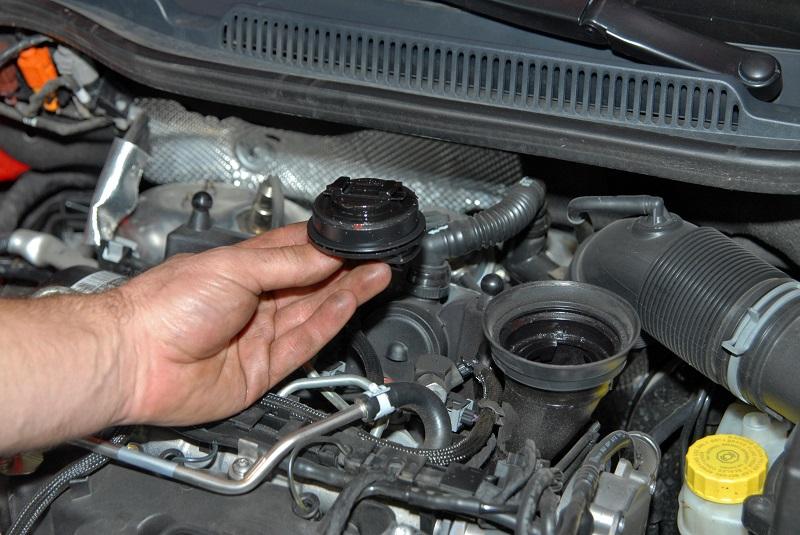Air coming out of the oil cap often indicates crankcase pressure build-up due to engine blow-by. A clogged PCV valve or worn piston rings can cause this issue.
Air escaping from the oil cap is a sign that your vehicle’s engine might be experiencing some underlying problems. This symptom suggests that gases which should be contained within the engine’s combustion chambers are slipping past worn components and into other areas, such as the crankcase.
Normal operation requires these gases to be vented safely via the Positive Crankcase Ventilation (PCV) system. A properly functioning PCV system ensures that these gases are recycled back into the engine for combustion, maintaining efficiency and reducing harmful emissions. Therefore, if you notice air puffing out of the oil cap, it’s essential to investigate and address the root cause promptly to prevent further engine damage and maintain optimal performance. Ignoring this warning sign could lead to more significant engine issues down the line.
Introduction To The Airflow Mystery
Why does air escape from your oil cap? It’s not magic, but a sign. Your car’s engine breathes too. Just like you, it needs to inhale and exhale. The oil cap is not a usual spot for air to exit. If it does, it’s time to play detective. Let’s uncover the reasons and fix them.
Symptoms Of Air Emission
- Oil cap hissing: Air makes a sound as it escapes.
- Engine performance dips: Your car might feel sluggish.
- Excessive engine oil: Too much oil can cause pressure.
Potential Consequences
| Issue | Effect |
|---|---|
| Oil leaks: | Oil can stain your driveway. |
| Engine damage: | Parts wear out faster. |
| Reduced mileage: | You may pay more at the pump. |
Credit: www.tiktok.com
Engine Anatomy And Ventilation Basics
Let’s dive into the Engine Anatomy and Ventilation Basics. An engine is like a big air pump. It sucks air in and pushes it out. This air helps burn fuel to make power. But, the engine also needs to breathe out unwanted air. This is where the oil cap and crankcase ventilation come into play.
Role Of The Oil Cap
The oil cap sits on top of the engine. It covers the oil fill hole. The cap keeps oil inside and dirt out. But, it’s not just a cap. It also helps the engine breathe.
- Keeps oil safe inside the engine.
- Stops dirt from getting in.
- Helps with engine breathing.
Understanding Crankcase Ventilation
The crankcase is the engine’s base. It has oil and air mixed together. This mix needs a way out. That’s what crankcase ventilation does.
Crankcase ventilation helps the engine in two ways:
- It removes unwanted air and pressure.
- It keeps the engine running well.
This system has a few parts. One part lets air in. Another part lets air out. The oil cap is part of this system. Air coming out of the oil cap means this system is working. But, too much air can be a sign of a problem.
Common Culprits Behind Air Puffing
Noticing air puffing from the oil cap can be unsettling. It often points to underlying engine issues. Let’s explore some common causes of this problem.
Worn Piston Rings
Piston rings seal the engine’s combustion chamber. Over time, they can wear down. This wear leads to compression leaks. These leaks allow air to escape. You’ll notice it when you remove the oil cap.
- High mileage vehicles are at risk.
- Increased oil consumption often accompanies this issue.
- Power loss and poor engine performance can result.
Valve Seal Leaks
Valve seals keep oil out of the engine’s combustion area. Leaky valve seals are another culprit. They allow oil to seep into the combustion chamber. This results in air puffing from the oil cap.
- Watch for blue smoke from the exhaust.
- Check for lower engine oil levels.
- Regular maintenance helps prevent this problem.
Pressure Buildup In The Crankcase
Pressure buildup in the crankcase is a sign of trouble. It can mean serious issues for your engine. Let’s dive into why this happens and what it does to your car.
Causes Of Excessive Pressure
- Blocked PCV Valve: The PCV valve releases gas from the crankcase. A block causes pressure to build.
- Worn Piston Rings: These rings keep oil out of the combustion chamber. If they wear down, pressure can get too high.
- Excessive Engine Load: Pushing your engine too hard increases pressure rapidly.
- Clogged Breather: The breather lets the crankcase breathe. If it clogs, pressure will build.
Impact On Engine Components
High pressure in the crankcase affects your engine. Here’s how:
| Component | Impact |
|---|---|
| Gaskets and Seals | They can fail, causing leaks. |
| Oil Quality | It can degrade faster. |
| Engine Performance | It might drop, leading to poor running. |
| Emission Systems | They can become less effective. |
Assessing The Pcv Valve Function
Let’s dive into the role of the PCV (Positive Crankcase Ventilation) valve. This small part plays a big job in your car’s engine. It keeps the engine clean and running well. But, what happens when air comes out of the oil cap? It might be a sign to check the PCV valve.
Significance Of Pcv Maintenance
Maintaining the PCV valve is key to a healthy engine. A working PCV valve prevents pressure build-up. It also stops oil from leaking. Over time, the valve can get dirty or clogged. This can lead to engine problems.
- Prevents engine oil leaks
- Reduces harmful emissions
- Improves fuel efficiency
Diagnostics And Replacement
Checking the PCV valve is simple. First, locate the valve on your engine. It’s usually on or near the valve cover. Then, take off the valve and check it. If it’s dirty or clogged, it’s time for a new one.
- Locate the PCV valve on the engine.
- Remove the valve and inspect it.
- If dirty or clogged, replace it.
Replacing the PCV valve is a quick and affordable fix. It can save you from bigger engine problems. Always choose a high-quality replacement valve.
Blow-by And Engine Health
Blow-by occurs when gases leak past the engine’s piston rings. It indicates engine wear. This can lead to air escaping from the oil cap. Proper engine health ensures longevity and performance.
Indicators Of Blow-by
- Excessive exhaust smoke: A classic sign of blow-by.
- Oil cap hissing: Air pressure escapes when you remove the cap.
- Decreased engine power: Lost compression equals less power.
- Oil level increase: Fuel contaminates the oil, raising its level.
- Engine misfires: Unburnt fuel passes into the crankcase.
Preventive Measures
- Regular oil changes: Clean oil protects engine parts.
- Engine check-ups: Detect issues early with routine inspections.
- Quality air filters: They keep dirt from entering the engine.
- Avoid aggressive driving: It stresses the engine less.
- Fix promptly: Repair any engine problems quickly.
Professional Insight And Diagnostics
Professional Insight and Diagnostics can shed light on why air might escape from your oil cap. Experts understand the intricacies of engine pressure and the signs of possible issues. They use specialized tools to diagnose and pinpoint the exact cause. This knowledge is crucial for maintaining engine health and performance.
When To Seek Expert Help
Identifying the right time to consult a professional is key. Look for these signs:
- Excessive oil splatter under the hood
- Unusual engine noise or performance
- Check engine light activates
Do not ignore these warnings. They indicate a need for a professional evaluation.
Advanced Diagnostic Tools
Mechanics use advanced tools for accurate diagnoses. These include:
| Tool | Function |
|---|---|
| Compression tester | Measures engine cylinder pressure |
| Leak down tester | Identifies specific leak sources |
| Diagnostic scanner | Reads engine fault codes |
With these tools, experts provide accurate solutions. Trust them to handle your engine’s health.

Credit: carfromjapan.com
Repair And Maintenance Tips
Understanding why air might escape from an oil cap is crucial. It helps prevent engine damage. The next section covers key repair and maintenance tips.
Sealing The Issue
Identify the cause first. A worn seal or gasket could be the culprit. Replace these parts promptly. Ensure all components fit snugly to avoid future leaks.
Check the cap’s condition. Replace if cracked or broken. Use only recommended parts for your vehicle model.
Regular Check-ups And Oil Changes
Maintain a schedule for engine check-ups. This detects issues early. Replace oil every 3,000 to 5,000 miles or as advised by your manufacturer.
- Monitor oil levels regularly. Low levels can indicate leaks.
- Inspect for debris or sludge buildup. Clean as necessary.
- Choose quality oil and filters. These protect against contaminants.
Keep a log of maintenance. This helps track your engine’s health and performance.
Myth-busting And Misconceptions
Let’s explore engine myths and facts. Misunderstandings often arise about air coming from the oil cap. This section clears up common myths and presents the realities of engine airflow.
Common Myths
- Myth: Air from the oil cap signals engine failure.
- Myth: A sealed engine never releases air.
- Myth: More air equals a serious leak.
Realities Of Engine Airflow
Engines breathe. Air release is normal. It’s part of how engines work. The crankcase often expels air. This is due to pressure changes within. A certain amount of airflow is expected and healthy for engine function.
Conclusion: Ensuring Engine Longevity
Ensuring engine longevity is key to a healthy car.
Air coming out of the oil cap can signal issues.
Let’s dive into how to keep your engine running smoothly.
Summary Of Key Points
- Air escape from the oil cap is not normal.
- It suggests possible engine wear or damage.
- Regular checks can catch issues early.
Final Recommendations
- Inspect the PCV valve for clogs or damage.
- Schedule regular engine check-ups.
- Replace worn gaskets or seals promptly.
- Maintain a clean oil filter.
Following these steps will help your engine last longer.

Credit: www.reddit.com
Frequently Asked Questions
What Causes Air To Escape From Oil Cap?
Air escaping from the oil cap often indicates crankcase pressure buildup due to worn piston rings, clogged PCV valve, or engine blow-by.
Is Air From The Oil Cap A Bad Sign?
Yes, air coming out of the oil cap can signify underlying issues such as engine wear or a malfunctioning positive crankcase ventilation (PCV) system.
Can A Faulty Pcv Valve Cause Air Leakage?
A faulty PCV valve can cause improper crankcase ventilation, leading to air being forced out through the oil cap.
How Does Blow-by Affect My Engine?
Blow-by can lead to increased oil contamination and crankcase pressure, potentially causing engine performance issues and air escaping from the oil cap.
What Are Symptoms Of High Crankcase Pressure?
Symptoms include oil leaks, air coming out of the oil cap, increased oil consumption, and a rough-running engine.
Conclusion
Discovering air escaping from your oil cap can be puzzling, yet it’s a sign your car needs attention. Regular maintenance and timely inspections are key to preventing such issues. Remember, a healthy engine ensures a smoother ride. Don’t ignore these warning signs; let them guide you to keep your vehicle in top condition.

















